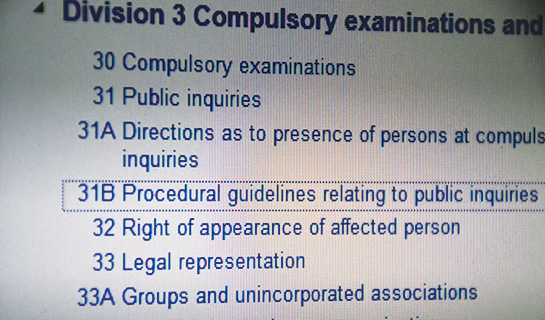Corruption Matters - May 2018 | Issue 51
Procedural guidelines for the ICAC
In 2016, an amendment to the Independent Commission Against Corruption Act 1988(“the ICAC Act”) introduced a new section, 31B, about procedural guidelines relating to public inquiries. These are guidelines that the ICAC Commissioners are required to issue to ICAC staff (and also Counsel Assisting the Commission) relating to the conduct of public inquiries.

How did s 31B come about?
The object of the amendments was to change the structure, management and procedures of the ICAC to give effect to recommendations of a report, tabled in Parliament in October 2016, by the Parliamentary Committee on the Independent Commission Against Corruption. Section 31B of the ICAC Act provides that the purpose of the guidelines is to address:
(a) the investigation of evidence that might exculpate affected persons ,
(b) the disclosure of exculpatory and other relevant evidence to affected persons,
(c) the opportunity to cross-examine witnesses as to their credibility,
(d) providing affected persons and other witnesses with access to relevant documents and a reasonable time to prepare before giving evidence,
(e) any other matter the Commission considers necessary to ensure procedural fairness.
To whom would these guidelines be of interest?
Primarily, they are for ICAC staff and Counsel Assisting. However, other interested stakeholders might include people directly affected by public inquiries, legal representatives and the general public.
What is procedural fairness?
Procedural fairness requires that a decision-maker (like the ICAC) uses a fair and proper procedure when making a decision. The steps required to provide procedural fairness will vary depending on the circumstances.
At the ICAC, for example, procedural fairness requires that an individual is notified of, and then given a reasonable opportunity to respond to, any potential adverse findings against them. Other examples of procedural fairness might include providing affected persons and other witnesses with access to relevant documents and a reasonable time to prepare before giving evidence.
What is exculpatory evidence?
The ICAC Act does not define “exculpatory evidence”. In simple terms, it is evidence that exonerates or tends to exonerate an individual. For the purpose of the Guidelines, exculpatory evidence means:
…credible, relevant and significant evidence that tends to establish that a person has not engaged in the corrupt conduct that is the subject of the Commission’s investigation.
Are the guidelines available to the public?
Yes, they are available on the ICAC website.
|
